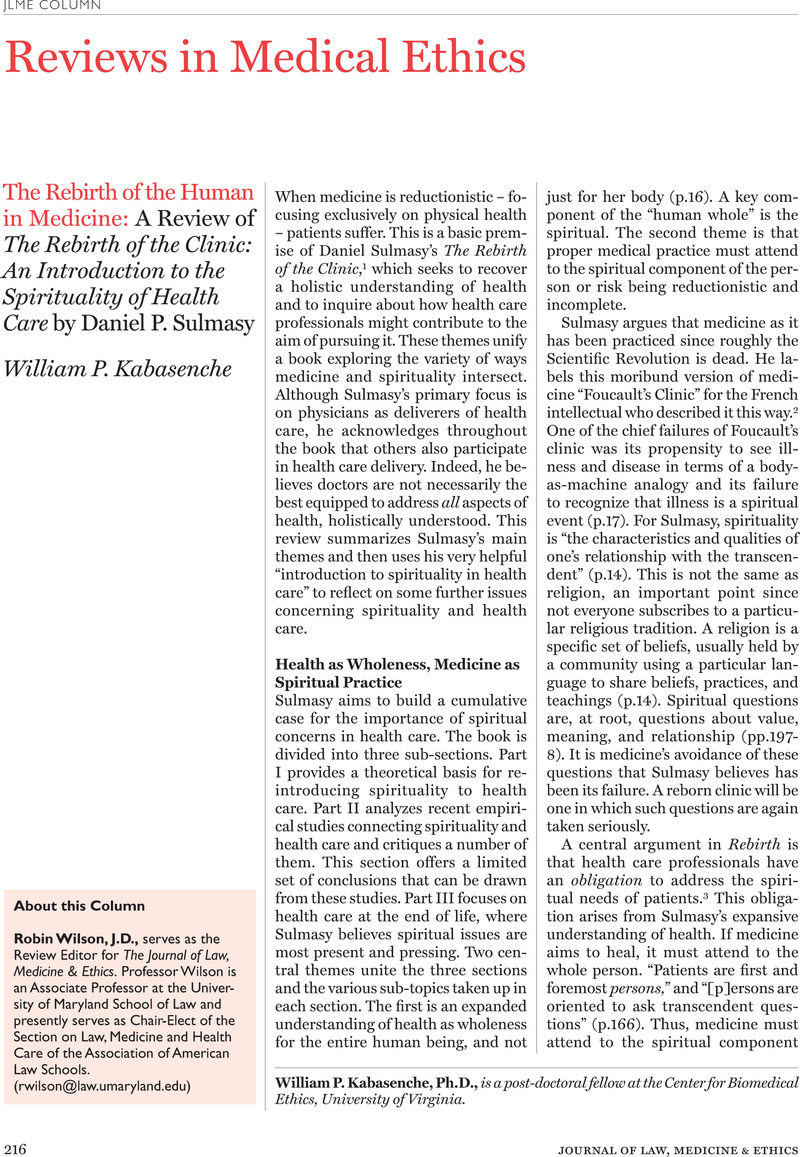No CrossRef data available.
Article contents
Reviews in Medical Ethics: The Rebirth of the Human in Medicine: A Review of The Rebirth of the Clinic: An Introduction to the Spirituality of Health Care by Daniel P. Sulmasy
Published online by Cambridge University Press: 01 January 2021
Abstract
An abstract is not available for this content so a preview has been provided. Please use the Get access link above for information on how to access this content.

- Type
- JLME Column
- Information
- Copyright
- Copyright © American Society of Law, Medicine and Ethics 2007
Footnotes
Robin Wilson, J.D., serves as the Review Editor for The Journal of Law, Medicine & Ethics. Professor Wilson is an Associate Professor at the University of Maryland School of Law and presently serves as Chair-Elect of the Section on Law, Medicine and Health Care of the Association of American Law Schools. (rwilson@law.umaryland.edu)
References
Sulmasy, D. P., The Rebirth of the Clinic: An Introduction to Spirituality in Health Care (Washington, D.C.: Georgetown University Press, 2006). All further references to this book will be in the text.Google Scholar
See Foucault, M., The Birth of the Clinic: An Archeology of Medical Perception, trans. Sheridan Smith, A. M. (New York: Vintage, 1994). Sulmasy's own title echoes Foucault's.Google Scholar
This is the theme of Chapter 10 in particular.Google Scholar
Interestingly, Sulmasy himself is probably far more qualified than the average health care professional. In addition to being an M.D. (and a Ph.D. in philosophy), he is a Franciscan Friar. One assumes he is readily at home talking about religious and spiritual issues with his patients and could be particularly helpful for those in the Roman Catholic or broader Christian traditions. Further, while health care professionals may not be specially qualified as professionals, it is certainly true that some individuals are specially qualified as persons to provide the humane, relationally-sensitive care that Sulmasy advocates.Google Scholar
For an interesting set of essays exploring richer conceptions of human beings and their health, see Taylor, C., Dell'Oro, R., eds., Health and Human Flourishing: Religion, Medicine, and Moral Anthropology (Washington, D.C.: Georgetown University Press, 2006).Google Scholar
Pellegrino, E. D., “Toward a Reconstruction of Medical Morality: The Primacy of the Act of Profession and the Fact of Illness,” Journal of Medicine and Philosophy 4 (1979): 32–56.CrossRefGoogle Scholar
Although Sulmasy also holds out hope that “there is enough common moral ground remaining among physicians to craft a single oath for all of them” (p. 105).Google Scholar
For powerful arguments about the dangers of health care choices becoming inappropriately commodified, see Shuman, J. J., Meador, K. G., Heal Thyself: Spirituality, Medicine, and the Distortion of Christianity (New York: Oxford University Press, 2003), particularly Chapter 3, “Religious Belief as Commodity Fetishism: Individualism, Therapy, and the Market.”9. Saying exactly why not, given the picture of health as wholeness and the obligation to pursue it, might be difficult for Sulmasy.CrossRefGoogle Scholar
Paul Ramsey's book The Patient as Person (New Haven: Yale University Press, 1970) is among the most widely cited in Rebirth.Google Scholar
Incidentally, this may also be a way to understand health care professionals' conscientious refusals to deliver care. When a doctor won't perform an abortion, or a pharmacist won't fill a prescription for a lethal dose obviously intended for assisted suicide, or a nurse won't be complicit in the medical “care” of tortured terror suspects, they are all saying, in effect, “This is not part of my vision of what health and health care are about.” Thus, it is not just an individual refusal to become complicit but a principled stand for a particular vision of the collective aims of health care.Google Scholar
In Book III of the Republic, Plato wrestles with questions about the proper limits of medicine. These questions are taken up in McKenny, G. P., To Relieve the Human Condition: Bioethics, Technology, and the Body (Albany, NY: SUNY Press, 1997). Attention to the kinds of questions posed by Plato will be necessary if we are to keep the rebirth of the clinic from delivering to us a monster.Google Scholar
This is a theme of Walker Percy's novel Love in the Ruins (New York: Ivy Books, 1971/1990) and is also discussed in Percy's essay, “The Delta Factor” in Message in the Bottle (New York: Farrar, Straus and Giroux, 1975/1998). Both of these works by Percy are discussed in Elliot's, C. Better than Well: American Medicine Meets the American Dream (New York: W.W. Norton & Company, 2003): Chapter 6, “Three Ways to Feel Homesick.”Google Scholar


